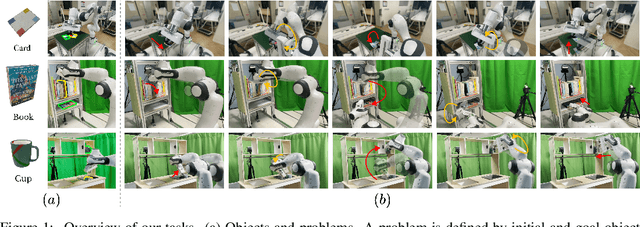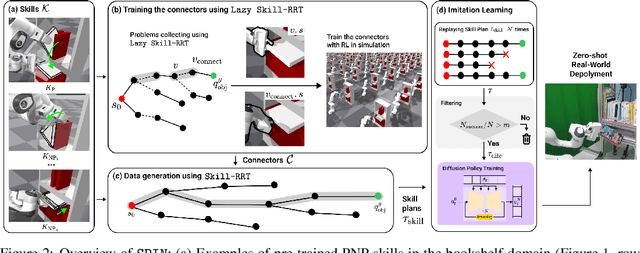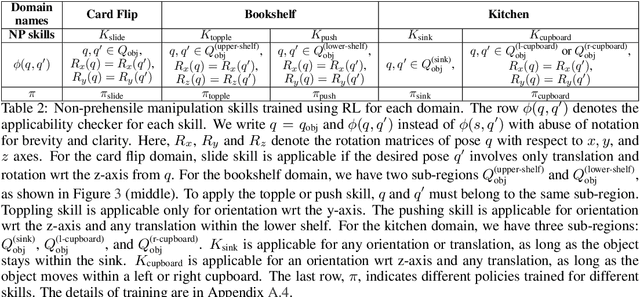Haewon Jung
From planning to policy: distilling $\texttt{Skill-RRT}$ for long-horizon prehensile and non-prehensile manipulation
Feb 26, 2025



Abstract:Current robots face challenges in manipulation tasks that require a long sequence of prehensile and non-prehensile skills. This involves handling contact-rich interactions and chaining multiple skills while considering their long-term consequences. This paper presents a framework that leverages imitation learning to distill a planning algorithm, capable of solving long-horizon problems but requiring extensive computation time, into a policy for efficient action inference. We introduce $\texttt{Skill-RRT}$, an extension of the rapidly-exploring random tree (RRT) that incorporates skill applicability checks and intermediate object pose sampling for efficient long-horizon planning. To enable skill chaining, we propose $\textit{connectors}$, goal-conditioned policies that transition between skills while minimizing object disturbance. Using lazy planning, connectors are selectively trained on relevant transitions, reducing the cost of training. High-quality demonstrations are generated with $\texttt{Skill-RRT}$ and refined by a noise-based replay mechanism to ensure robust policy performance. The distilled policy, trained entirely in simulation, zero-shot transfer to the real world, and achieves over 80% success rates across three challenging manipulation tasks. In simulation, our approach outperforms the state-of-the-art skill-based reinforcement learning method, $\texttt{MAPLE}$, and $\texttt{Skill-RRT}$.
Learning context-aware adaptive solvers to accelerate quadratic programming
Nov 22, 2022Abstract:Convex quadratic programming (QP) is an important sub-field of mathematical optimization. The alternating direction method of multipliers (ADMM) is a successful method to solve QP. Even though ADMM shows promising results in solving various types of QP, its convergence speed is known to be highly dependent on the step-size parameter $\rho$. Due to the absence of a general rule for setting $\rho$, it is often tuned manually or heuristically. In this paper, we propose CA-ADMM (Context-aware Adaptive ADMM)) which learns to adaptively adjust $\rho$ to accelerate ADMM. CA-ADMM extracts the spatio-temporal context, which captures the dependency of the primal and dual variables of QP and their temporal evolution during the ADMM iterations. CA-ADMM chooses $\rho$ based on the extracted context. Through extensive numerical experiments, we validated that CA-ADMM effectively generalizes to unseen QP problems with different sizes and classes (i.e., having different QP parameter structures). Furthermore, we verified that CA-ADMM could dynamically adjust $\rho$ considering the stage of the optimization process to accelerate the convergence speed further.
 Add to Chrome
Add to Chrome Add to Firefox
Add to Firefox Add to Edge
Add to Edge